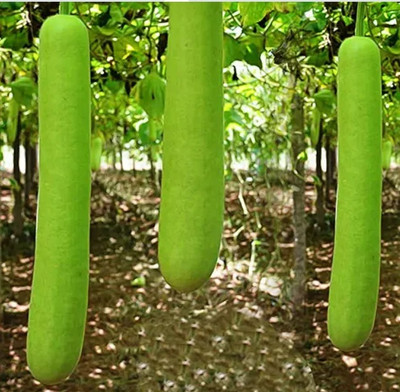VERL Bottle Gourad Seeds Seed(40 per packet)
Quick Overview
Product Price Comparison
Bottle gourd (Lagenaria siceraria) Bottle gourd is a very popular and healthy annual vegetable. It is a long vine, whose flower is white and the leaves come in bigger. This popular vegetable is cultivated for thousands of years in Asia, Europe and America. It is also grown in large quantities in India, and its fruits are available throughout the year. Bottle gourd fruit is very nutritious. It is the annual vegetable plant, its leaves are large and lush and the plant is. The gourd comes in many sizes and shapes. Because of the shape of the bottle, it is called bottle gourd. It is known by many names, in India, it is known as a gourd, lauki, ghiya, and milk. This is important farming in India. Nature Brings are giving tips here very easy. Growing in a container ŌĆó Choosing a place for bottle gourd sowing is important. Where sunlight comes directly, the place is most suitable. Its plant needs sunlight 8 hours a day. In which it thrives well. These plants do not tolerate shade. ŌĆó You can easily apply bottle gourd in your garden or container. If you grow bottle gourd in the container, then use the deep and wide container. A container of at least 20 inches diameter will be appropriate. ŌĆó Bottle Gourd is a vine, it needs a place to spread it if you have a lack of space then apply it on the roof so that it can be easily trellis. On the field, you can spread it on the fence. ŌĆó To apply bottle gourd, you can bring its seeds from any garden shop or nursery. ŌĆó This is a summer-growing vegetable. Its seeds can sprout indoors in a 4-inch wide pot. For this, the ideal temperature (at least 20 degrees Celsius) should be free from heat and frost. Keep moisture in the soil. If you need quick germination then soak the seed in the water overnight. ŌĆó Its seeds sprout in about 10 days. Let it grow for a few days when the plant becomes slightly mature, shift these plants out into the garden or put them in a large container. Growing time The appropriate time to plant seeds for gourd grow is from June to July. This is monsoon or rainy season crop . for summer crop February is most suitable for summer crops. Indoor Seedling Indoor seedling start in those areas that affect late spring frost. For such parts, choose a place where the sunlight comes, the southern window can be a good choice. For this, sow 2 seeds of bottle gourd per 4 inch Peat Pot. Then the seedling and apply it to a seed per pot, when seed germination starts. When the plants grow, transfer the seedlings outside. Pollination Flowers come in about 40 days in bottle gourd plant. Where bee is lacking, you can pollinate its flowers with hands. Both men and female plants of gourd make flowers. Take a paintbrush and collect male yellowish stickypollen inside male flowers, then transfer it inside the female flowers. Care ŌĆó Mind it when the frost is over. Transfer these plants to the prepared soil by manure in late spring. ŌĆó This plant requires a lot of water, especially during the growing season, but hate the wet feet. ŌĆó When the main vine becomes 6 to 8 feet long, its growing tip is cut off, it strengthens the plant and helps encourage other branches. This helps in more stimulus of fruits and flowers. But this plant grows well in sandy loam soil. By adding organic manure you can make the soil rich. To cultivate gourd, use well-prepared soil by mixing the organic manure. This will give you high-quality vegetables. For this soil pH Level, 6.5 to 7.5 are ideal. ŌĆó Gourd plant needs water in a uniform manner, its soil does not dry up. The abundant water in the growing season encourages plant flower and fruit. Due to the state of drought, the tree will produce weak and less. ŌĆó Keep in mind that wherever this plant is available, there should be a good system of drainage. ŌĆó Use it spray seaweed solution or liquid fertilizer in every 3 weeks. ŌĆó Its plants are vines and can be up to 15 feet long. To climb it, you can use lattice. Harvesting After getting the desired shape, you can cut its fruit. It comes to work of vegetable and juice. Some farmers leave them to harden the gourd on the vine during the fall and winter, which are later used for crafts or other projects. The young gourd matures in about 60 days. Pests and diseases Bottle gourd is relatively free of problems, although slugs like their young plants. The leaves of the young plant have a special scent, which calls back the insecticide. Powdery Mildew is responsible for the damp heat conditions. This plant requires air circulation. Water drainage should also be well, otherwise, the roots should fear of rotting.


